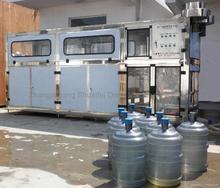 Tests have found excessive amounts of bacteria in barreled water leading to health concerns in South China's Guangxi Zhuang autonomous region.
Tests have found excessive amounts of bacteria in barreled water leading to health concerns in South China's Guangxi Zhuang autonomous region.An inspection of 18.9-liter barreled water, used in water dispensers, showed that eight out of 30 brands failed tests in the region, according to Guangxi's regional Administration for Industry and Commerce (AIC).
Most of the substandard water contained excessive bacteria, including coliform and mould, which could pose risks to human health, said Li Zhanxiang, director of the AIC's food circulation supervision department.
Microbes such as coliform and mould are indicators for food hygiene and food safety.
Illegal manufacturers of tainted water will be punished in accordance with the law, Li said.
Drinking tainted water could lead to symptoms like vomiting and diarrhea, or even food poisoning, according to Liu Xiaoling, vice-president of the Light Industry and Food Engineering Department of Guangxi University.
Guangxi is not the only place where substandard barreled water has been found. Northeast China's Liaoning and South China's Guangdong have also had problems.
In 2009, 50 percent of tested barreled water in Liaoning was found to be substandard. In 2007, almost 70 percent of tested barreled water was unfit to be drunk.
Contaminated water comes from unlicensed manufacturers, some without legal licenses for a number of years, according to the Department of Land and Resources of Guangxi (DLRG).
Wang Hai, the DLRG's geological environment department director, said many manufacturers failed to acquire production licenses, or forgot to renew, making their production illegal.
Most of the tainted barreled water was sold to the countryside, where cheap prices and a lack of supervision made them popular, he explained.
Wang said the existence of illegal manufacturers is due to a lack of cooperation among various departments, and that it is necessary to make joint efforts in cracking down on the problem.
Liu Xiaoling said that tainted water is a result of the manufacturers' slack attention to management of water resources.
"Their manufacturing environment is not up to standard, and their purification and sterilization processes are not strict enough," she said.
Liu suggested consumers buy trusted well-known brands, and that it should be drunk within ten days to avoid possible contamination.





